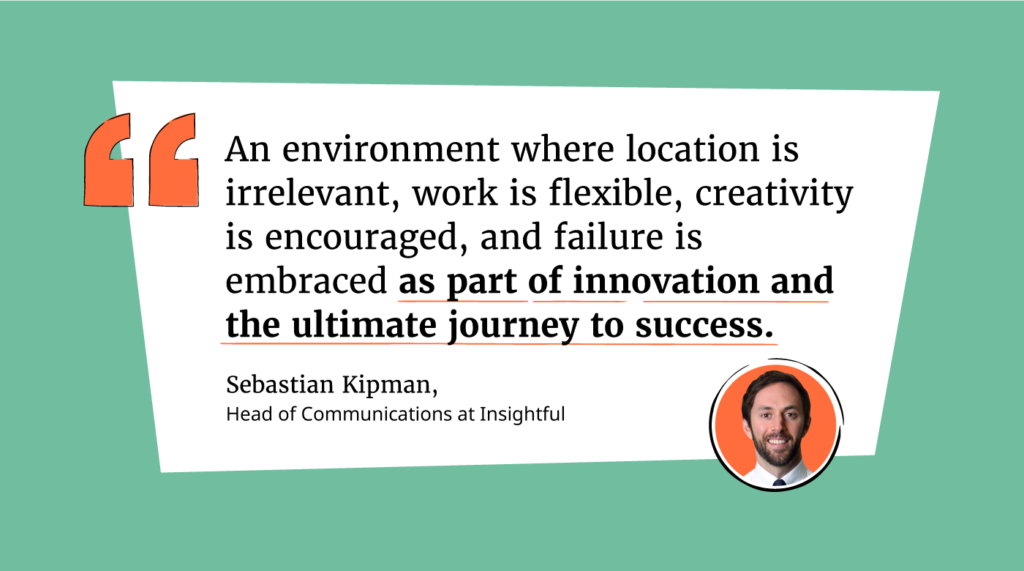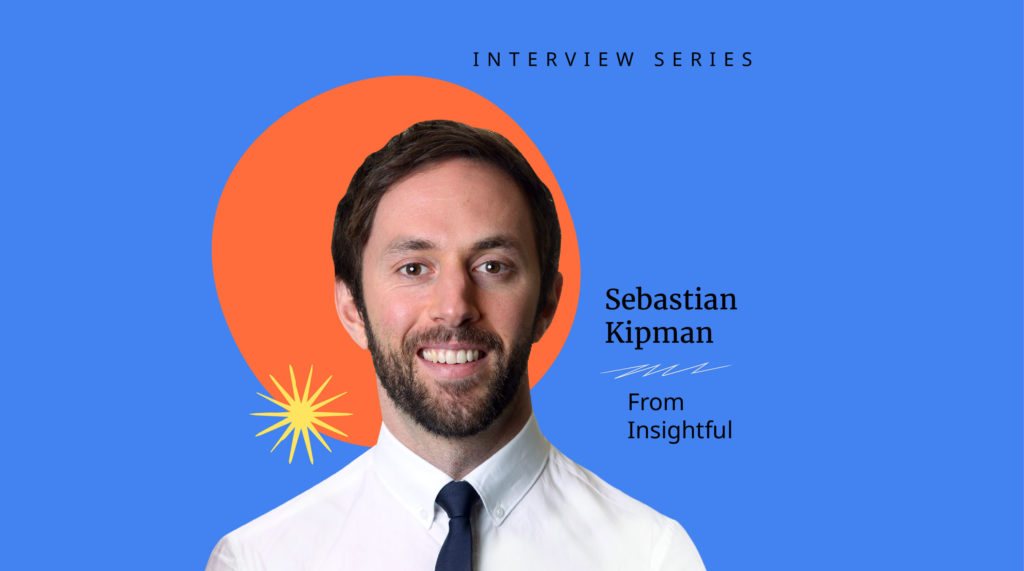We’re passionate about the world of work, and how we can make it better. To help satisfy our curiosity, we’ve launched an interview series where we pick the brains of experienced leaders, business owners, managers, and individual contributors to get their thoughts on how we can collectively build better workplaces.
We’d love to get to know you a bit better, tell us a bit about your backstory.
My backstory? I’m currently Head of Communications at Insightful.io where we build software that enables teams to do great work. I’m an Australian, working with a US company, with a team spread across four continents. So, safe to say, we’re remote-first at our core—and we have been before remote was really a thing.
How did I get here? After meeting online, the founders of Insightful and I have worked on multiple projects together over the years. Prior to that I worked in professional sports for Cricket Australia (think the NBA or NFL, but for cricket), as the next best thing after conceding my own dreams of being a professional athlete around the age of 18.
If we were to ask a friend to describe your personality to us, what would they say?
I hope they’d say something along the lines of: curious, adventurous, kind and atypical with a sense of humor that I try to bring to any circumstance that warrants it to make life fun and not take myself too seriously. You know what, I really should ask them some time…I might be way off!
Thinking back to your career journey, what’s an interesting story that stands out?
Well, there was that one time I accidentally took a selfie on David Hasslehoff’s iPhone.
Sebastian Kipman
But, more poignantly, the opportunities I had to use the profile and resources of professional sport and athletes to support Indigenous communities in Australia sticks with me more than anything.
The programs we worked on were varied, including education, health and increasing participation in sport. There is one occasion in particular where we spent hours driving into some of the most remote communities in central Australia.
These are places far from the big cities of Sydney and Melbourne, where you’re only permitted by invitation. There, among lands of deep, red dirt and miles of expanse in every direction, we were privileged to be invited into the community to learn about centuries’ old culture, and see a very different aspect of Australia. I’m so fortunate for this indelible experience.
What’s the most impactful lesson you've learned over your career thus far?
Always have a bias for action.
I have an analytic mind which, in the past, led to overthinking and a quest for perfectionism. Always having a bias for action has helped me overcome this.
This doesn’t mean be cavalier. Simply, move quickly and don’t dally due to over-analysis.
It’s amazing the opportunities that arise and solutions that are found when you simply focus on taking that next step, fast.
Sebastian Kipman
Thanks for giving us some insight into who you are! Let’s jump into things. When you hear the phrase “build a better world of work”, what comes to mind?

In short, workplaces should adopt a more agile, startup mindset.
For you, what’s the main blocker you see as standing in the way of building a better world of work?
Traditional mindsets about what work and productivity means. (Heck, even Elon Musk is convinced that anyone working from home is ‘phoning it in’). Traditional mindsets can be hard to budge, largely due to the certainty of the status quo and uncertainty of something new.
This is why conducting small scale experiments, setting defined metrics, and then assessing results against these can be a good way to shift mindsets, without having to take an all-or-nothing approach.
Sebastian Kipman
Sure, for certain industries and responsibilities, my vision for a better world to work won’t entirely apply. But, as we see a continued shift away from historic models of work, and Gen Y and Z become tomorrow’s leaders, I believe we’ll see this location-independent, flexible and creative model of work become increasingly prevalent. Hopefully, it’ll be the default.
What’s one thing within our control that we can practically do to build a better world of work today? And, how do you recommend going about it?
Actively encourage employees to experiment, test and learn. This doesn’t mean throwing out company strategy, abandoning OKRs, and going rogue; instead, set a percentage of employee time or activity that is dedicated to trying new, creative things.
To codify this exploration time, it can be made part of formal company policies and role descriptions, and the outcomes of this time can be enshrined in team goals or OKRs.
This dedicated process will help create a high agency environment where creative thinking and innovation are nurtured, new solutions are revealed, and micro-failures aren’t feared.
Can you share one thing you’ve experienced, seen, or read about that is leading us towards a better world of work?
Google’s famous “20% rule” is a great example of this. I’ll allow Google Founders Sergey Brin and Larry Page to explain:
“We encourage our employees, in addition to their regular projects, to spend 20% of their time working on what they think will most benefit Google. This empowers them to be more creative and innovative. Many of our significant advances have happened in this manner.”
Some of the “significant advances” they’re referring to? Hugely successful projects like AdSense and Google News.
I’ve also heard of the job site Indeed running a kind of an internal startup incubator program where employees can pitch new initiatives to work on with funding. This takes things to the next level.
I’m curious, thinking about building a better world of work, is there a company and/or leader who stands out to you as someone we should follow? If so, what are they up to?
I really love Matt Mullenweg’s approach to work.
He’s the founder of WordPress and Autommattic, and has been a long-term proponent of remote work. He’s built hugely successful, remote work teams across 96 countries and has been working that way for 15 years.
Almost all the stuff he puts out is great, but his article Distributed Work’s Five Levels of Autonomy is especially awesome. He also has one of the best personal domains in the game: ma.tt
How can our readers follow your work?
I’m notoriously inactive on social media. So, unless your readers are keen to view posts from 2014, the best bet is to follow along with what we’re building at insightful.io.
Thank you for adding your voice to People Managing People’s interview series on How to Build a Better World of Work!
Add Your Voice To The Conversation
Join our interview series and share your ideas for how we can build a better world of work!

